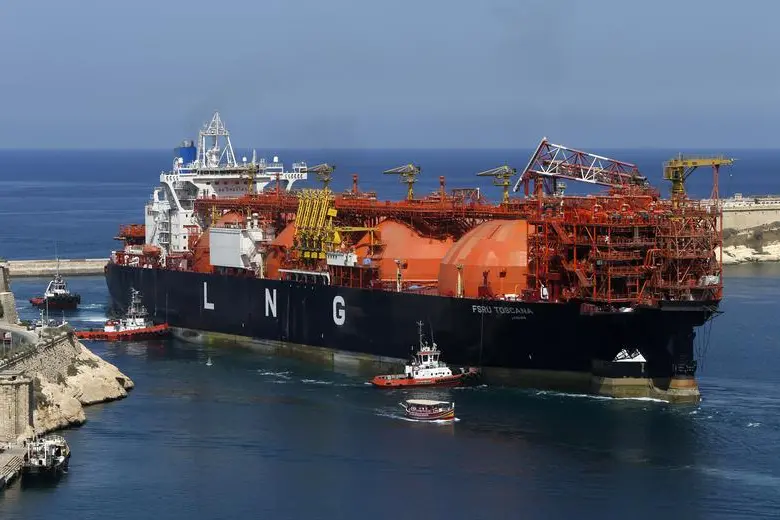PHOTO
30 May 2016
Qatar's LNG industry is "well positioned to compete at lower prices" Samba Financial group has said and noted that the outlook for LNG prices "remains bearish" in 2017.
Liquefied natural gas prices have continued to trend down this year and implied Asia spot price currently trades at around $4mbtu, Samba said in its latest "Qatar Chart Book".
Many companies made billions of dollars of investment in LNG capacity during the boom years. This "wave of supply is coming online just at a time when global demand growth looks modest - leading to a massive oversupply of LNG."
"We expect prices to stay at $4-5mbtu (million British thermal units) for the remainder of the year - a long way from the $14mbtu average in 2014," Samba said.
Indeed, RasGas recently renegotiated long-term contracts for LNG sales to India. With this in mind, Samba has adjusted Qatar's total export revenues slightly lower to $60bn in 2016.
This figure represents a fall from the 2014 level - resulting in a current account deficit of 6% of GDP, although Samba expects a "return to surplus" in 2017.
Qatar's budget for 2016 "focuses on maintaining capital spending while consolidating expenditures" elsewhere. This should support sustained growth of around 4% over the next two years, Samba said.
Qatar's budget for 2016 foresees the first deficit in 15 years, coming in at 4.8% of GDP based on oil prices of $48 for barrel (Samba anticipates a larger deficit of 5.8% based on its $40 estimate).
Budgeted expenditures total $55.6bn, which represents a 7.3% cut from the last full-year budget.
There is already evidence of fiscal consolidation; the subsidy on petrol has been cut with prices rising 30%-35% in January, while the price of gas and electricity has also increased.
The Ministry of Finance announced that any deficits (Samba estimates 2016
-17 deficits will total $18bn) would be funded entirely through debt issuance (both domestic and external) rather than drawing on external savings.
This will lead to an increase in the government's debt which, as a ratio to GDP is projected to approach 50% (in part due to lower nominal GDP).
The Government has already issued $7.4bn worth of domestic bonds and sukuk since September 2015 as well as a $5bn syndicated loan, which was taken up by international banks.
"A sovereign $5bn Eurobond is also due shortly," Samba said.
The capacity of the domestic banking sector to absorb government debt was tested after the September and November bond and sukuk issuances, prompting a large spike in the interbank rate, Samba noted.
Qatar's LNG industry is "well positioned to compete at lower prices" Samba Financial group has said and noted that the outlook for LNG prices "remains bearish" in 2017.
Liquefied natural gas prices have continued to trend down this year and implied Asia spot price currently trades at around $4mbtu, Samba said in its latest "Qatar Chart Book".
Many companies made billions of dollars of investment in LNG capacity during the boom years. This "wave of supply is coming online just at a time when global demand growth looks modest - leading to a massive oversupply of LNG."
"We expect prices to stay at $4-5mbtu (million British thermal units) for the remainder of the year - a long way from the $14mbtu average in 2014," Samba said.
Indeed, RasGas recently renegotiated long-term contracts for LNG sales to India. With this in mind, Samba has adjusted Qatar's total export revenues slightly lower to $60bn in 2016.
This figure represents a fall from the 2014 level - resulting in a current account deficit of 6% of GDP, although Samba expects a "return to surplus" in 2017.
Qatar's budget for 2016 "focuses on maintaining capital spending while consolidating expenditures" elsewhere. This should support sustained growth of around 4% over the next two years, Samba said.
Qatar's budget for 2016 foresees the first deficit in 15 years, coming in at 4.8% of GDP based on oil prices of $48 for barrel (Samba anticipates a larger deficit of 5.8% based on its $40 estimate).
Budgeted expenditures total $55.6bn, which represents a 7.3% cut from the last full-year budget.
There is already evidence of fiscal consolidation; the subsidy on petrol has been cut with prices rising 30%-35% in January, while the price of gas and electricity has also increased.
The Ministry of Finance announced that any deficits (Samba estimates 2016
-17 deficits will total $18bn) would be funded entirely through debt issuance (both domestic and external) rather than drawing on external savings.
This will lead to an increase in the government's debt which, as a ratio to GDP is projected to approach 50% (in part due to lower nominal GDP).
The Government has already issued $7.4bn worth of domestic bonds and sukuk since September 2015 as well as a $5bn syndicated loan, which was taken up by international banks.
"A sovereign $5bn Eurobond is also due shortly," Samba said.
The capacity of the domestic banking sector to absorb government debt was tested after the September and November bond and sukuk issuances, prompting a large spike in the interbank rate, Samba noted.
© Gulf Times 2016





















